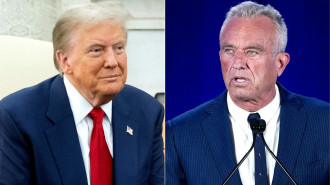UN presents four options to secure Palestinian safety
Four options hoping to secure the protection of Palestinians in Israeli-occupied territories were presented by the UN Secretary-General on Friday.
In a report requested by the General Assembly, Antonio Guterres highlighted different options from sending UN rights monitors and unarmed observers to deploying a military or police force under UN mandate, following the recent flare-up in the region which saw 171 Palestinians killed by Israeli fire since late March.
The UN chief stressed that for each of the options, cooperation by Israel and the Palestinians would be necessary. It remained unlikely however that Israel would agree to the proposals.
In the 14-page report, Guterres proposed:
- Providing a "more robust UN presence on the ground" with rights monitors and political officers to report on the situation.
- Pouring in more UN humanitarian and development aid to "ensure the well-being of the population."
- Creating a civilian observer mission that would be present in sensitive areas such as checkpoints and near Israeli settlements, with a mandate to report on protection issues.
- Deploying an armed military or police force, under a UN mandate, to provide physical protection to Palestinian civilians.
A UN mandate for a protection force would require a decision from the Security Council, where the United States could use its veto power to block a measure opposed by Israel.
A small European-staffed observer mission was deployed in the West Bank city of Hebron in 1994, but Israel has since rejected calls for an international presence in flashpoint areas.
In the report, Guterres said the United Nations was already undertaking many protection initiatives but that "these measures fall short" of the concerns raised in a General Assembly resolution adopted in June.
Israel scaled up its brutal violence against Palestinians in Gaza when protester held peaceful marches on the border with Israel, calling for their right to return to homes lost since the establishment of the Jewish state.
Out of Gaza's nearly 2 million inhabitants, 1.3 million of them are refugees whose families were forcibly during the exodus referred to the Nakba or catastrophe in 1948, during the creation of Israel.







 Follow the Middle East's top stories in English at The New Arab on Google News
Follow the Middle East's top stories in English at The New Arab on Google News
![Ben & Jerry's has taken Unilever to court for its alleged attempts to silence it [Getty]](/sites/default/files/styles/image_330x185/public/2024-11/GettyImages-2183900214.jpg?h=199d8c1f&itok=jEcYtQ64)

![The meeting between Musk and Iravani was 'positive', Iranian sources said [Getty]](/sites/default/files/styles/image_330x185/public/2024-11/GettyImages-2184077711.jpg?h=f5c1ac2a&itok=Wb2mIhsF)